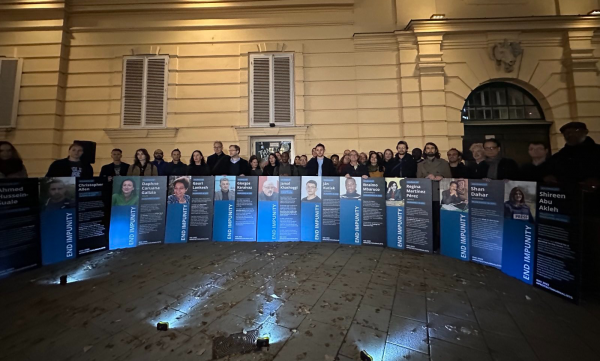Syrian forces should immediately release foreign journalists currently being held captive in the country and ensure that all journalists are free to report on the civil war without the threat of abduction, the International Press Institute (IPI) said today.
Dozens of journalists have reportedly been abducted and 11 killed in Syria so far this year by various sides of the conflict, including government forces loyal to President Bashar al-Assad, rebel groups, and in some cases non-Syrian Islamic extremists. According to IPI’s Death Watch, 51 journalists have been killed in the country since the beginning of the Syrian civil war in 2011.
Those currently being held captive in Syria include: two French journalists, a German freelance reporter, an Italian newspaper correspondent, a Belgian academic/freelance writer, an American freelance journalist, a Jordanian television journalist of Palestinian origin and possibly others.
According to international reports, French journalists Didier Francois, 53, a war reporter with Radio 1, and 22-year old photojournalist Edouard Elias are said to be alive after being kidnapped at a checkpoint near Aleppo in early June. It is thought that the two were apprehended by government forces, though their exact whereabouts are currently unknown. A group of journalists had publicly demanded the release of the two earlier this month, and on July 14, French Defence Minister Jean-Yves Le Drian said that Paris would be working for their freedom.
In early May, government forces captured Armin Wertz, a German freelance journalist near the border with Turkey. According to the Berlin-based daily Der Tagesspiegel, for which Wertz was a frequent contributor, the journalist had entered the country without permission and was initially held at a police station in Aleppo, before being moved to the coastal city of Latakia. Shortly after Wertz’s capture, the German Foreign Ministry said in an official statement that they were working for his release, but no news has emerged since then.
Shortly before Wertz’s abduction, Domenico Quirico, an Italian newspaper reporter working for La Stampa, and Pierre Piccinin, a Belgian freelance reporter and academic, went missing around the same time near the city of Homs in western Syria. It is not known whether the two were taken together, but the area had witnessed a recent increase in violence following the Assad regime’s May offensive there. La Stampa reportedly informed the Italian Ministry of Foreign Affairs (9) of Quirico’s disappearance after six days without hearing from him.
Piccinin, who has written several articles about Syria for the Belgian news outlet Le Soir, has not been heard from since at least the middle of April. He had allegedly been travelling with another journalist, though it is unclear whether that was Quirico.
Finally, three other foreign journalists abducted in Syria have also been missing since 2012.
The parents of American freelance journalist Austin Tice recently traveled to Beirut to seek information concerning the disappearance of their son. According to news reports, Tice’s family had not heard from him since last August, when he travelled to Syria to report on the conflict. His family said that he had been preparing to leave the country for Lebanon when he went missing. The U.S. State Department said in a statement that Tice had smuggled himself into the country to report there and was captured by government forces.
James Foley, an American freelance reporter who contributed to GlobalPost, was captured by unidentified gunmen in November 2012. The CEO and president of GlobalPost, Philip Balboni, said in a May 3rd speech marking World Press Freedom Day that Foley “was “most likely abducted by a pro-regime militia group and turned over to Syrian government forces.” The Syrian government has so far denied knowledge of Foley’s whereabouts. Al-Hurra journalist Bashar Fahmi has also been missing since August 2012 when he was hurt in a battle in Aleppo. His current whereabouts are also unknown.
“The abduction of journalists by various sides of the conflict in Syria must stop,” IPI Director of Communications and Public Relations Anthony Mills said. “We remind all sides of this conflict that journalists are neutral observers who are risking their lives in Syria to provide critical information to the world, Mills added.


